Iranians Hold Gatherings to Protest Poor Living Conditions
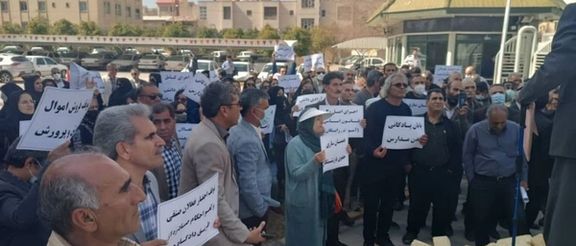
As the "Women, Life, Freedom" protests continue in Iran, various groups continue to protest the poor living conditions and the devaluation of the national currency as inflation topped 50%.

As the "Women, Life, Freedom" protests continue in Iran, various groups continue to protest the poor living conditions and the devaluation of the national currency as inflation topped 50%.
On Wednesday, several cities across Iran including Tehran, Ahvaz and Arak, were scenes of protests reflecting the desperation felt by the failure of the regime to deal with crippling economic conditions. Increasingly, ordinary people and many politicians criticize the government for its inefficiency and lack of a credible plan to deal with the financial crisis.
In the southern city of Ahvaz pensioners gathered in front of the social security building "to protest the poor living conditions and low level of their monthly benefits.”
Retired teachers also held protests in Tehran to support colleagues whose pay is barely enough to live while also voicing opposition to unfair adjustment to pensions. Meanwhile, shop owners went on strike in Arak, resulting in stores across the city closing their doors as prices soared.
These daily protests are compounding the pressure on the regime as they come alongside the nationwide protests against the dictatorship that have swept the country for more than five months.
The Islamic Republic continues to show an iron fist in dealing with the protests that began with the death of Mahsa Amini in the custody of morality police in September, arrested for the inappropriate wearing of her hijab.
Over 500 people have since been killed by the regime forces according to rights groups, with several executed for their participation in protests. Thousands more have been arrested, including children.
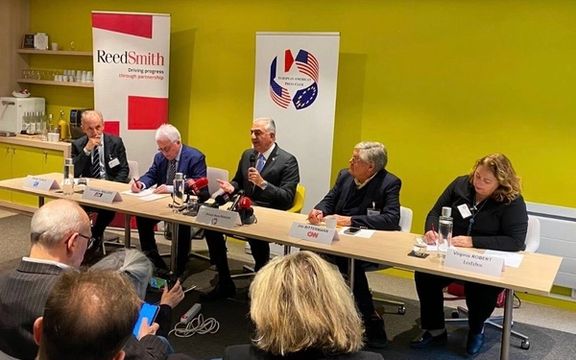
Iranian opposition figures who have recently formed a united front against the Islamic Republic have once again called on other countries to cut ties with the regime.
During a conference in the European American Press Club (EAPC) in Paris on Wednesday, Prince Reza Pahlavi said that if Western countries adopt the policy of “maximum support” for the current protests, the regime will not last long. It would take months as opposed to years, if the international community stands behind the popular protests.
He called for tangible measures to support the Iranians who are out on streets for over five months now such as providing the means for better flow of information and internet access and establishing funds to back the striking workers in the country. Pahlavi suggested that the Islamic Republic’s assets frozen in foreign banks because of sanctions can be used for such purposes.
About his tour of Europe along with fellow dissident figures to garner support for the uprising, he said the voices of the protesters in Iran and the diaspora should be heard by politicians from all across the political spectrum. He referred to his Tuesday meeting with two French senators from different parties, saying the entire political establishments of countries should stand behind the people of Iran.
The question is no longer who will replace the Islamic Republic, but how to overthrow the regime, Pahlavi underlined.
He emphasized that people of Iran do not seek foreign interference and military attack, but want support for their movement against the clerical regime, which can manifest itself in acts of civil disobedience, strikes in different industries and defection among the ranks of the military, especially the lower ranks.
Prince Pahlavi urged the international community not to continue negotiations with the Islamic Republic, saying that instead of seeking the regime’s change of behavior, governments should seek regime change in Iran.
Reiterating the call for designating the Revolutionary Guard as a terrorist organization, he said that it will bring security to the region because its destabilizing activities will decrease. He added that regional countries such as Israel, Saudi Arabia, and even Lebanon, which are affected by the destabilizing role of the IRGC, should ask Western countries to list the outfit as a terrorist organization.
He referred to the resolution overwhelmingly passed by the European Parliament in January, expressing hope that European states would act on it and designate the IRGC.
On Monday, an estimated crowd of about 20 to 30 thousand people held a rally in Brussels outside the European Council to call on EU countries to designate Iran’s Revolutionary Guard as a terrorist organization. Thousands of Iranians from all over Europe held a massive rally in Strasbourg in January for the same purpose. Also on Monday, the EU sanctioned 32 Islamic Republic officials, including culture and education ministers, deputy IRGC commander, and several MPs. The move can be seen as a measure to justify the fact that the EU is not yet ready to designate the entirety of the IRGC.
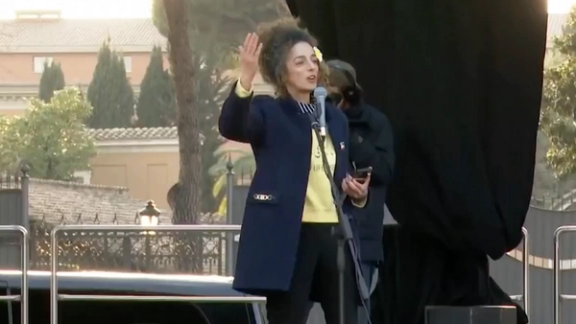
A few hours after Pahlavi’s conference in Paris, two other opposition figures, women’s rights activist Masih Alinejad and Canada-based activist Hamed Esmaeilion addressed a huge rally in the Italian capital Rome. The demonstration in Rome took place a day after the two held a panel about the uprising in Iran at the Italian Senate.
"People of Iran, we are all sentenced to death under the shadow of the Islamic Republic for the crime of being a woman, being gay, being a Jew, being a Baha'i, etc,” Alinejad said, referring to the regime’s persecution of minorities during its 43 years of rule. Calling for unity, she reminded the crowd that they are gathered together from all walks of life and with different ideologies under the banner of “Women, Life, Liberty.”
Esmaeilion talked about freedom as the main goal of the uprising, saying that justice is only achieved in freedom. "Don't be disappointed if they don't put the IRGC in the list of terrorist groups right after a big demonstration," he said, urging more efforts to push world countries toward further isolation of the regime and its most important arm, the IRGC.
He once again demanded the expulsion of the Islamic Republic’s ambassadors from Western countries, noting that "with or without the help of democratic countries, we will topple the dictator."
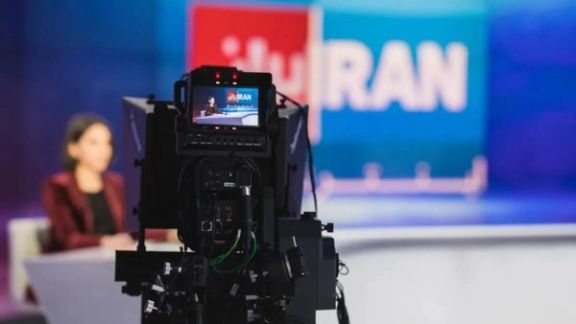
Iran’s Revolutionary Guard has taken credit for the relocation of Iran International studios from the UK to the US following terror threats, calling it a victory for the Islamic Republic.
IRGC Commander-In-Chief Major General Hossein Salami said Wednesday that the threats against the Persian channel’s journalists, which forced the channel to stop its broadcasting in London and move to Washington DC, "show how far the Islamic Revolution's realm of power, field of infiltration and radius of influence has extended."
Iran International was warned by authorities in November that its journalists were under threat from Iranian agents and the Metropolitan Police took measures to strengthen security around the network’s office in the area. On February 18, the network announced that following the advice of UK anti-terrorism officials it decided to temporarily move its studio operations to the US.
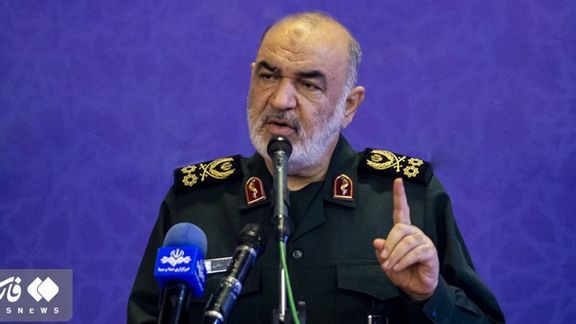
The decision solicited condemnations of Iran’s malign activities and worldwide reactions. “At its sharpest, this has involved police and MI5 working together to foil 15 plots since the start of 2022 to either kidnap or even kill British or UK-based individuals perceived as enemies of the regime,” said a senior official of UK counter terrorism police.
Despite the evident threats against Iran International’s journalists and UK’s acknowledgment of them, as well as several rallies by Iranian diaspora communities across Europe this month to push countries to list the IRGC as a terror outfit, European states are still hesitant.
Economic embargoes and sanctions were among other measures the enemies used along with their entire intelligence and legal systems as well as international institutions and media powers to defeat the Islamic Republic, but they failed, Salami said, implying that the global community did not manage to designate IRGC as a terrorist organization or curb its destabilizing activities in the region and beyond.
Western countries have strongly rebuked Tehran for its bloody crackdown on protests, its military support for Russia’s invasion of Ukraine and lack of compromise over its highly disputed nuclear program. The IRGC is the most important arm of the regime, doing the heavy lifting of cracking down on Iranians and circumventing global sanctions to sell oil and funnel money to keep the regime afloat.
Salami added that “the enemies” are disappointed by the failure of all their strategies and have reached out for help from opposition figures “who are not even worth mentioning.”
After a historic forum in Washington earlier this month by eight prominent dissident activists, they have been traveling to events around the world to make the voice of the Iranian opposition heard. Such events signal the emergence of a leadership council in the diaspora to campaign for international support in favor of Iran’s protest movement.
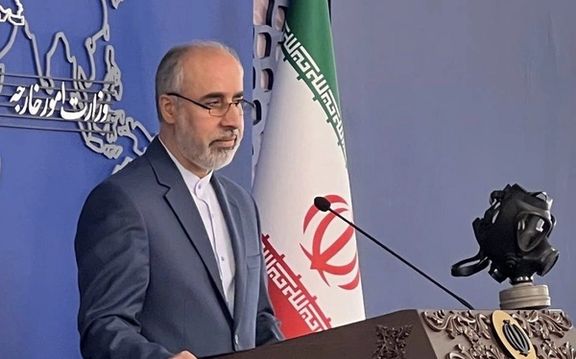
In an interview on Tuesday, Iran’s Foreign Ministry spokesman Nasser Kanaani, however, dismissed Iran International’s relocation as a win for the regime, rather a coordinated effort by Western intelligence services.
Kanaani said that the Islamic Republic reserves the right to file a lawsuit against the US over the TV channel’s role in “inciting riots,” reiterating the regime’s propaganda line that blames foreign countries for over five months of antigovernment protests.
“The developments surrounding the Iran International terrorist media indicate that the channel is being supported and managed by the intelligence services of a number of certain countries, including the UK,” the spokesman said. “From our viewpoint, even if the channel is relocated from London to the US, the responsibility will still lie with the governments sponsoring and hosting such quasi-media, particularly the UK government, in relation to its (the channel’s) terrorist, separatist and anti-Iranian activities,” he added.
On Monday, UK’s Security Minister Tom Tugendhat at the British Parliament voiced full support for Iran International TV, saying “The Home Secretary and I absolutely condemn this outrageous violation of our sovereignty, and the attempted violation of the human rights of those journalists.”
“Its operatives and affiliates will be pursued by the Ministry of Intelligence,” Intelligence Minister Esmail Khatib said in November. “And from now on, any kind of connection with this terrorist organization will be considered to be tantamount to entering into terrorism and a threat to the national security of the Islamic Republic of Iran.”
On Monday, an estimated crowd of about 20 to 30 thousand people held a rally in Brussels outside the European Council to call on EU countries to designate Iran’s Revolutionary Guard as a terrorist organization. Thousands of Iranians from all over Europe held a massive rally in Strasbourg in January for the same purpose.

Business owners in different Tehran districts have closed their shops to show anger at the tumultuous economic situation as the national currency hit historic lows against US dollar in recent days.
A video shared on twitter shows people in Alladdin cell phone center have gathered calling on shop owners to stop doing business.
In Tehran’s Sattar Khan and Nazi Abad neighborhoods the guilds have also closed their stores, social media posts showed.
There are also some reports of gatherings near Tehran Grand Bazaar at the heart of the capital’s commerce district. Some say the government shut down the Internet in area, as often happens during protests.
Some videos on twitter show people chanting anti-regime slogans in Tehran subway stations.
Another video on Twitter showed most businesses closed in the city of Arak in central Iran.
Underground activist groups that have organized popular protests since September had issued a call for demonstrations on Wednesday at bazaars around the country.
The rial, which fell to a low of 500,000 against the US dollar on Monday stayed around the same level.
Officials announced that citizens will not be allowed to buy their annual share of foreign currency from official exchange bureaus, which previously was $2,000 per person, per year. They also said the government will stop providing dollars to banks and official dealers for that purpose.
Meat and other prices shot up, as a general mood of panic emerged over rising inflation in the coming days.
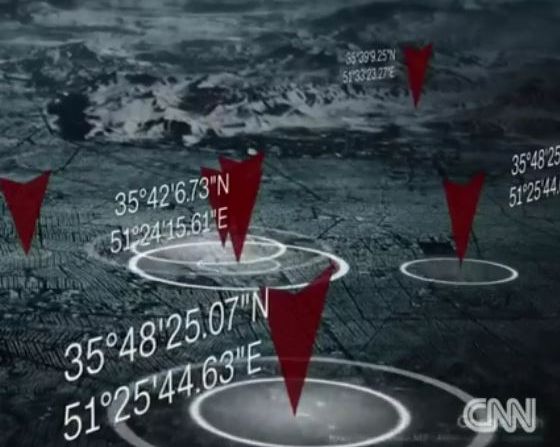
A CNN investigative report shows how the Islamic Republic uses a network of secret prisons to torture and suppress protesters, as well as to obtain force confessions from them.
The network has been able to find the location of more than 40 unofficial torture centers and undeclared secret prisons in Iran, which are located in government-controlled facilities such as the basement of mosques.
To find the exact location of the secret detention centers, CNN interviewed eyewitnesses and detainees of the recent protests and matched this information with satellite images.
According to the report, eight, six, and five secret torture centers have been identified in Tehran, Sanandaj in the west, and Zahedan in the southeast, respectively.
In other cities such as Karaj, Mashhad, Tabriz, Kermanshah, Amol, Saqqez, etc., dozens of secret prisons have been identified based on the information provided by eyewitnesses.
Based on the CNN report, these secret prisons were places for torturing protesters to force them to confess so that the courts could issue heavy sentences such as death penalty for them.
Keyvan Samadi and Mohsen Sohrabi are two protesters interviewed by the CNN who had been imprisoned in these secret detention centers.
Injecting a substance to keep the prisoner alive, "kissing the neck and body" by the torturer, sexual torture with a baton are the things that Samadi and Sohrabi mentioned in an interview with the CNN.

A veteran reformist and an aide to former President Mohammad Khatami says the totalitarian regime has alienated over 80 percent of Iranians who no longer want the Islamic Republic.
In a speech Sunday, Javad Emam, the CEO of Khatami’s Baran Foundation, which he set up after his presidency came to an end in 2005, argued that the dictatorship’s acting against the will of the people, means they “are the ones actually causing regime change”.
Speaking at the Veterans Society Party’s 4th congress, Emam, the party's secretary general, strongly criticized the government’s foreign policy including regional policies which he said “drove Iran's Arab neighbors to Israel’s bosom”.
Addressing party members, which consist mainly of reformist veterans of the Iran-Iraq War, he said the country's foreign policy had also failed to restore the 2015 nuclear deal which has “resulted in the poverty and misery of Iran and Iranians”, and spurred Iran's collaboration with Russia in its war against Ukraine.
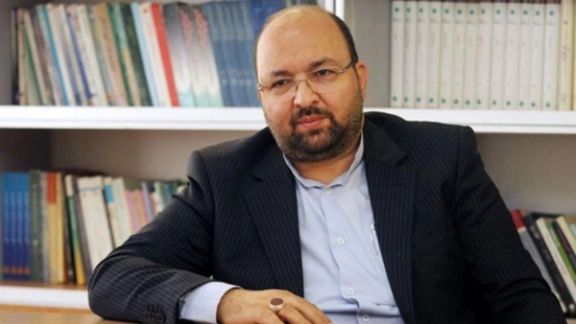
Iran has been supplying military drones to Russia since mid-2022, which Moscow has used to target Ukraine’s infrastructure. The United States and European powers have strongly warned Tehran to cease its military cooperation with Russia.
Khatami’s aide warned the government that “in the near future people will no longer listen to them if it does not listen to the voice of people”.
Emam’s sharp criticism comes on the heels of unprecedented popular protests and statements by other key reformist figures who have either called for a referendum to change the regime or serious and fundamental changes in Iran’s politics and economy.
Khatami said in November that regime change, as protesters demanded on the streets, was “neither possible, nor desirable” due to the inequality of the powers of the government and the people. But he also warned the hardliner establishment over continuing the status quo which he said would only deepen the prospects of “societal collapse”. He proposed reforms in the system as the “least costly and most useful” way out of the current quagmire the regime has gotten itself into.
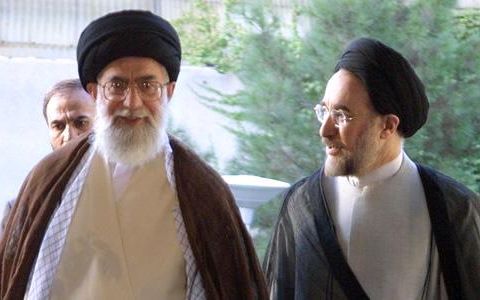
The Green Movement leader Mir-Hossein Mousavi, who was a presidential candidate in 2009 and has been under house arrest since 2011, however, in a statement on February 4, declared that the Islamic Republic was no longer reformable and fundamental change was required to “save Iran”. He proposed elections to appoint a constitutional assembly to write a new constitution and a referendum on the new constitution and its proposed form of government.
A day after Mousavi’s statement, Khatami, who was banned from the media and political activity as well as leaving the country years ago, also issued a statement which many saw as his opposition to Mousavi’s proposal and his insistence on preserving the Islamic Republic at any cost.
In his speech, Emam criticized Mousavi’s views and seemed to be siding with Khatami. He claimed that regime change views are promoted by those who want to cause a rift among reformists and the people.
Khatami and Mousavi both believe in non-violence and are against any foreign interference in Iranians’ affairs, he argued.
He added that before these two leaders’ statements, his own party had in an open letter to the Supreme Leader Ali Khamenei warned about the dire situation in the country and stressed the necessity of deep reforms and returning to the full implementation of the Constitution before it was too late.